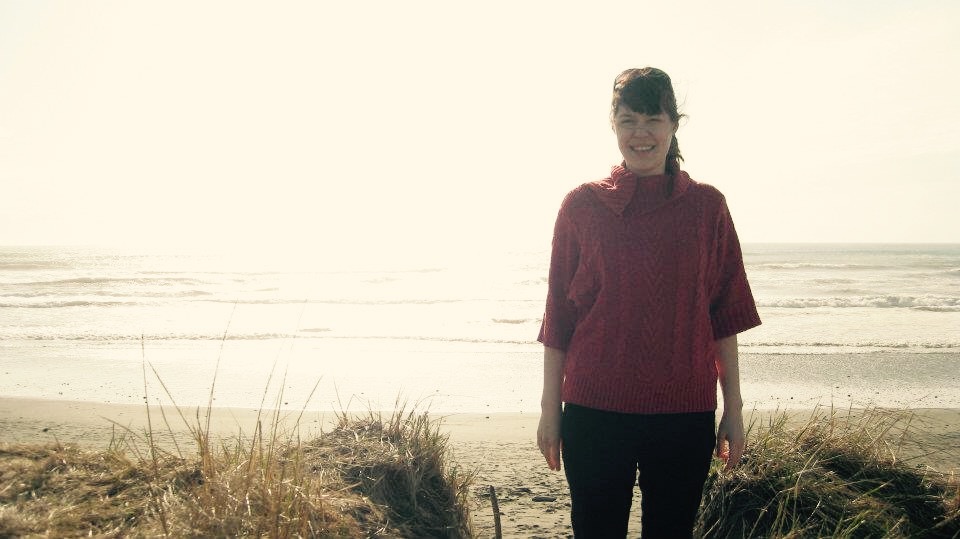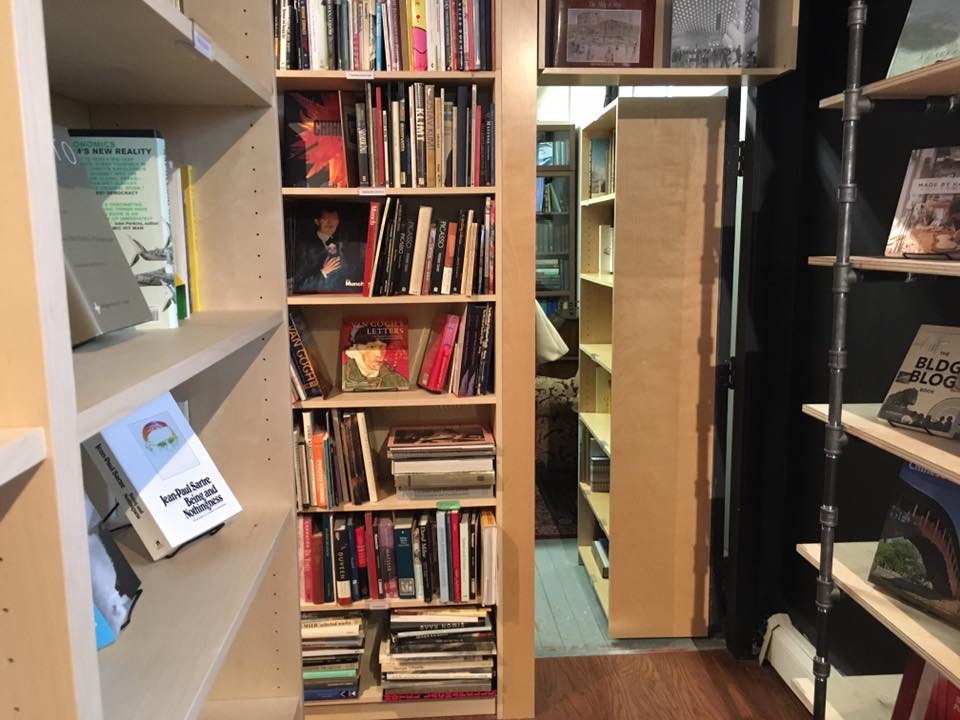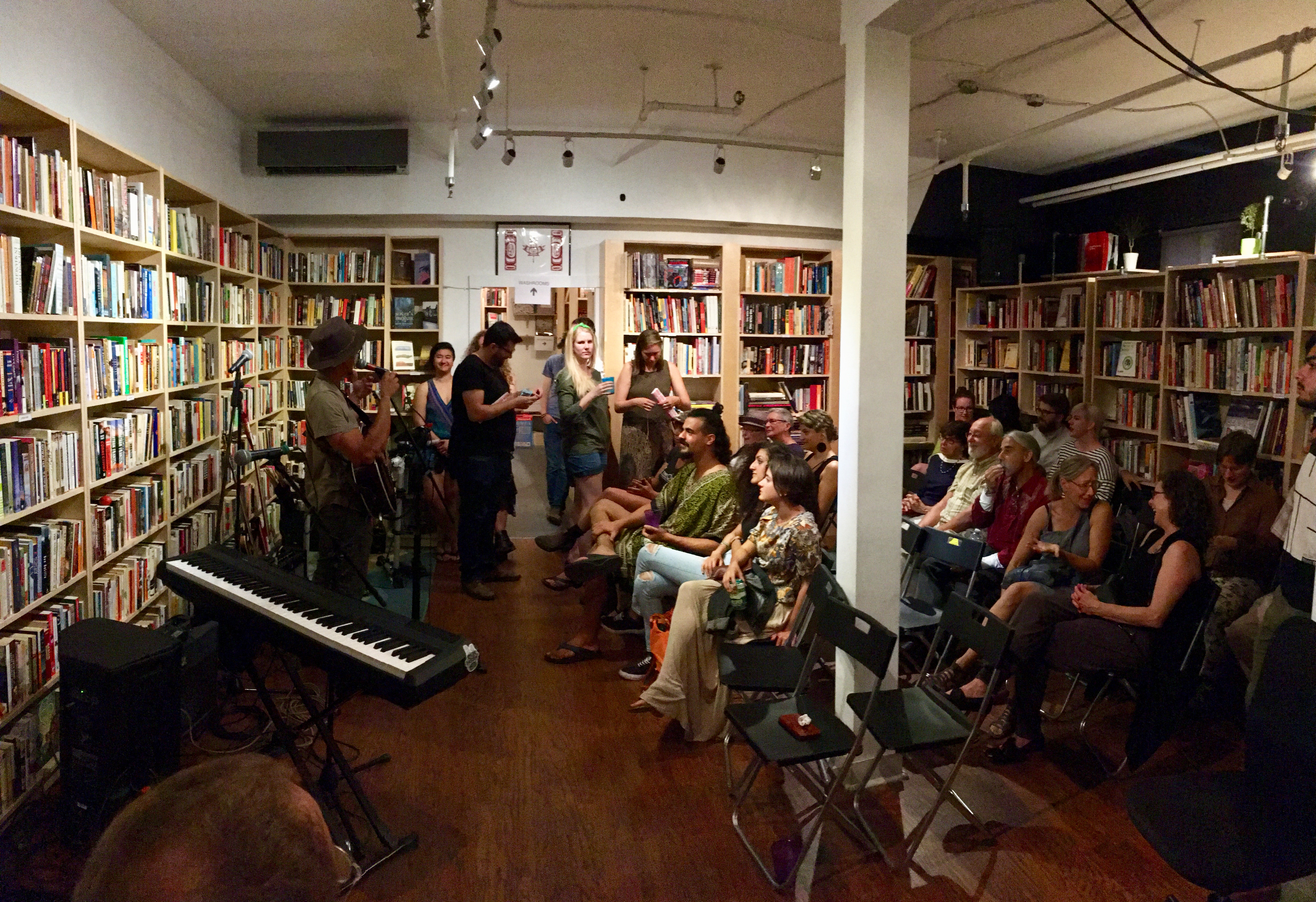
Interview by Jessica Johns and Claudia Wilde
In addition to providing resources for emerging writers on our website, PRISM is dedicated to featuring spaces and organizations that exist at the intersection of writing and community. Spaces that are essential to bridging the gap between what is uncertain and what is possible. Naturally, our attention turned to Massy Books, a 100% Indigenous-owned and operated bookstore. Currently, the store is located at 2206 Main Street, Vancouver, but will be moving to their new location of 229 E. Georgia St at the end of February. Though the new location will have a different layout, it will preserve its secret bookshelf door (built by carpenter Sam Grzesik, owner of S.G. Contracting and who also worked on the set of Harry Potter!). Other features include 14 ft high pipe shelving with semi-rolling ladders and a 500 sq. ft art gallery space upstairs.
Massy Books is owned by Patricia Massy, who is of Cree and English descent and a member of the As’in’i’wa’chi Ni’yaw Nation (Kelly Lake Cree Nation). She’s had the exciting opportunity in her past life to work and travel with the carnival, and spent years in the non-profit sector fundraising for and coaching individuals in need of support. After eight years in university, she chose to become a self-employed bibliopolist because going to university was too expensive to satiate her thirst for knowledge and stories. Patricia brings to her bookstore the kind of love and excitement for community building that is rare to find, but is exactly the kind of energy that allows creativity to flourish. Here, Patricia tells us about her passion for books, the importance of community support, and her favourite books by Indigenous writers.

What lead you to the decision to open a bookstore in Vancouver?
Our family (father’s side) had a bookstore in Cork, Ireland in the 1800’s, so I had to open one! I didn’t discover this until after the fact though. In all actuality, I was going through a transition and decided I wanted to work for myself doing something I enjoyed. Books have always brought me joy and made me feel connected to my own humanity and I wanted to feed that. I went to a ceremony and came out of it with a clear vision to open a store. I started selling books online, but soon realized it was more enjoyable interacting with people than selling over a computer screen in a dark warehouse by myself. Opening Massy Books was entirely intentional. I wanted a different life for myself, so I created it.
What do you hope Massy Books as a business is able to accomplish?
First and foremost, I hope we’re a reliable source for books! Even if we don’t have a particular title in stock, we’ll try and find it, even if it means sending a customer to another bookstore, or purchasing it from halfway across the globe. Secondly, we want our store to be a destination, a place where people feel they can spend an afternoon browsing, looking at art, and enjoy being in a beautiful space. I hope our store is also utilized for literary, educational, and artistic purposes in the community as well.

What is your favourite section in the store?
Oh, I love them all. Since opening the store, I’ve been fixated on acquiring as many Indigenous books as I can. I love learning about my Indigenous history through stories, poetry, and non-fiction. The last four books I’ve read this year were written by brilliant Indigenous women writers.
When did you really start to enjoy reading?
My father tells me I started reading when I was about three years old, but I remember consuming scads of books when I was in kindergarten. I stopped when I started getting into trouble as a teen, then picked it back up again at eighteen, when I got a job Save-On-Foods in their book department.
Do you have a specific place you like to read?
I love reading while sipping on my morning coffee and eating porridge, as well as in bed at night. My favourite place to read is when I’m traveling, though. Nothing beats vacation and a good book!
You have a rare book room that can only be accessed through a secret bookshelf door, and the layout and decor of the place is highly magical. How does attention to the majestic connect to reading for you?
Books and stories have a kind of portable magic and I wanted the store to reflect that. In terms of the bookshelf door into the rare book room, it already had a heavy-duty metal door installed. Our contractor said it would be fairly simple to build, so we couldn’t decline.

Where do you find your books for the rare book room?
I acquired most of them through estate collections. Nearly all our Chinese history and science came from a retired UBC physics professor named Bill Dalby. I met him through an artist friend who introduced us. He was downsizing and I was looking for books. I was so inspired by his collection (and him in general), I almost named the store, Dalby Books! Then I came to my senses and realized it might be strange to steal someone else’s last name. Many of our Indigenous, BC, and Canadian history came from the UBC Rare and Special Collections department. They were making room for a Reconciliation Library and needed the books out within a week. Another bookseller apprised me of the situation and I jumped on it.
Your website places a lot of emphasis on community. Why is it important for you to provide a space where community and literature intersect?
I’ve worked in the non-profit world longer than anything else, so when I started this entrepreneurial journey it was important to bring that experience and commitment to the community with me. The idea of leaving it behind entirely felt strange. To remain involved, we raise money for three organizations: Battered Women’s Support Services (BWSS), the Writer’s Exchange (WE), and Respecting Aboriginal Values and Environmental Needs (RAVEN). Room Magazine has been exceedingly generous, and donated a slew back issues to sell by donation. All profits go to BWSS. WE also provides us with back issues, with the proceeds going back into operating their programs. Currently we donate 10% of all our profits to these three organizations.
In terms of community, literature, and art, there needs to be spaces to tell stories, connect, and organize. Literature has the power to enrich lives and build community, so if we can provide a low-cost or free space and be part of that, we will. Currently, our space is free for authors launching their work if we are are the ones selling the book.

In addition to providing space, that community mentality extends to operating with sustainability in mind. What things do you do to facilitate environmental sustainability?
Buying and selling used books is 100% environmentally sustainable! Instead of throwing away good, used books, we buy and resell them. Whatever books we don’t sell, we donate. We currently use biodegradable bags, but switching entirely to recycled paper in the coming months. We package and ship our books in recycled paper and cardboard, and have partnered with a local architecture firm that donates their old drawings so we can repurpose them for packaging our online orders.
Do you hold community events and/or have community partnerships?
Yes! All bookshelves in the middle of the store are built on castors and make room for approx. 60 people. Our new space will also have a 500 sq. ft mezzanine/art gallery to for artists. Currently we have two concerts, a wedding, two reading series, and four book launches scheduled for this year. I think we might actually need to hire a volunteer (payment with books, anyone?) to manage our events. Something else we’re really excited about is an Indigenous women’s art show we’re having this year. Stay tuned for that.
While we don’t have any official partnerships, we’re working with Room Magazine on an upcoming Indigenous reading series. More information on this will be announced during their Growing Room Literary Festival on March 1st, which everyone should go to!

What is your favourite book of all time?
That’s difficult, it changes the more I read and the older I get. If I have to choose one book though, it would be Thomas King’s The Truth About Stories. His book explores the power of stories, how they shape who we are, and emphasizes the weight of responsibility those stories can carry, especially regarding stereotypes and Indigenous identity.
What are you reading right now?
Seven Fallen Feathers: Racism, Death, and Hard Truths in a Northern City by Tanya Talaga.